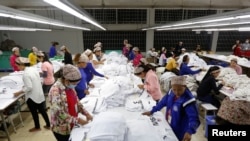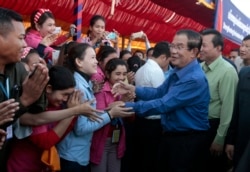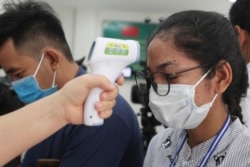The Cambodian government is shoring up its finances as the withdrawal of some European Union trade preferences leaves its mark on an economy already struggling with the COVID-19 pandemic and an exodus of Western businesses.
The hardest hit is the $7 billion garment, textiles, and footwear industry, where about 700,000 workers earn a basic $190 a month, including $7 for transportation and rent, producing for big-name brands such as Levi's Strauss, H&M, and Adidas, six days a week.
The government has allocated a $1.2 billion spending package to help offset losses from the partial withdrawal of trade preferences under the ‘Everything But Arms’ program - which provides duty- and quota-free access to the EU market for all products other than arms -- that went into effect last month and the impact of the pandemic which has taken a heavy toll on a once-thriving industry.
Phen Kosal, who has worked at Hung Wah Cambodia garment factory producing clothing for export for the last six years, says the EBA partial withdrawal was having a dreadful impact on her work prospects amid layoffs, loss of overtime, and reduced hours.
“Now, I am begging for the government’s help because of this issue. I’m also in debt with the banks and financial institutions, which is why I’m desperately seeking help.”
Her sentiments were echoed by Sao Chen, who works at the Meng Da Footwear factory. He estimated that overall earnings - including his own - were down 20 percent, while many workers had been laid off for four to six months.
“The main problem we are facing today is some workers are the only breadwinners feeding an entire family at home. Sometimes their monthly income is only $100 to $200 and they spend everything on rent, food, kids’ school – and there are many more costs.”
EBA trade preferences go to the least developed countries that meet international standards of democracy and human rights.
However, a ban preventing the main opposition party from contesting elections in 2018 amid a crackdown on dissent and the independent press resulted in a victory for Prime Minister Hun Sen’s long-ruling Cambodian People’s Party in every contested seat.
That upset the EU – Cambodia's largest trading partner, accounting for 45 percent of 2018 exports – prompting the withdrawal of the preferences. The partial withdrawal has hit about 20 percent of Cambodia's exports to the EU, and early estimates say this will cost the business about $130 million.
Garment Manufacturers Association in Cambodia data shows that 450 garment and footwear factories in Cambodia had suspended work, while 83 factories closed in the first half of this year, affecting about 150,000 workers.
GMAC Secretary-General Ken Loo said the EU had erred by withdrawing those preferences on August 12, amid the COVID -19 pandemic, which has had a much greater impact on the Cambodian economy.
“Numerous brands and retailers in Europe and North America have canceled or delayed orders due to the drop in retail sales in Europe from the pandemic,” he said.
“Consequently, millions of Cambodian citizens could fall back into poverty due to this crisis.”
There are other issues affecting the economy. The ports are crammed with goods once destined for the EU. High debt levels among small borrowers in the microfinance industry and a sharp drop in remittances from workers abroad amid the pandemic have also taken a toll.
Meas Sok Sensan, the spokesperson of the Ministry of Economy and Finance, put a brave face on the withdrawal telling the government-friendly news portal Fresh News this did not mean Cambodia would lose export markets in Europe.
“Europe is still Cambodia's exporting destination. The EBA partial withdrawal means some Cambodian goods are no longer on the tax exemption list anymore,” he said.
While brands, however, can move to another country, as many Western expat businessmen and NGOs did after the elections, their workers cannot.
“I think this issue is going to make for some job losses for the worker if we don’t have the orders or if the brand does not stay in the country,” said Athit Kong, president of the Coalition of Cambodian Apparel Workers’ Democratic Union.
“I think the parties need to work together to maintain and to keep this benefit for the country, and especially for the workers,” he said.









